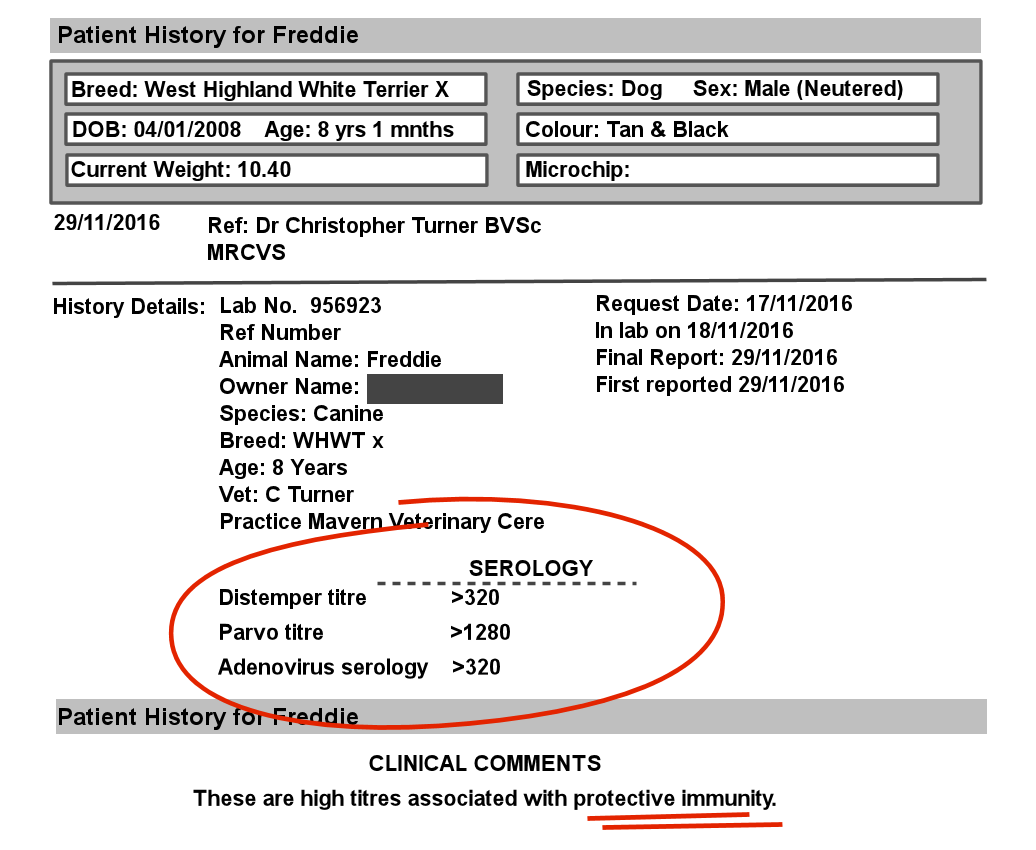Titre Tests for Dogs - An alternative to vaccinations?
Vaccinations are an important part of keeping your dog healthy. The question is: how often does your dog need to be vaccinated? Titre testing can be a helpful part of answering that question and reducing the number of vaccinations your dog needs.

Vaccinations protect dogs from potentially fatal diseases. Not too long ago, dogs used to be given vaccination boosters every year to maintain the protection. However, in recent years, scientific studies have shown than the protection conveyed by vaccination often lasts much longer than a year, and booster vaccinations don't need to be given as frequently.
This is good news, as there have also been some concerns that over vaccination may actually be causing additional health issues. To help determine whether a dog needs a booster vaccination blood tests, called titre tests, have become widely available. A titre test checks a dog's immunity to different diseases to see if they are in need of a booster vaccination or are already protected.
Here are some frequently asked questions about vaccination and titre testing so you can learn how it may fit into your dog's vaccination routine.
How do vaccinations work?
A vaccination gives your dog's immune system a preview of a disease, allowing it to prepare for encountering it in future. When a dog's comes into contact with a disease, their immune system tries to protect them by developing antibodies to attack it. Different diseases need different antibodies to attack them and they take time for the immune system to manufacture. This means a disease can make a dog very sick before their immune system has time to respond.
When a dog is vaccinated it develops antibodies ready to attack a disease and these are stored ready for future use. This means the immune system can respond quickly if you dog is exposed to the disease, and attack it before it has time to make your dog sick. This is called immunity.
Why do dogs need booster vaccinations?
The protection developed after a dog receives a vaccination can decrease over time. How long it lasts depends on the disease, vaccination and the dog's own immune system. A booster vaccination acts as a reminder to the immune system, to ensure that it is still familiar with the disease and ready for action.
How often should a dog have booster vaccinations?
There is some debate over how often booster vaccinations are needed. In recent years, after scientific studies into the duration of immunity, there have been changes to the recommended frequency of boosters. Whilst all vaccinations used to be given annually, now booster vaccinations for some core diseases are only recommended every three years.
The suggested gap between boosters for each disease is based on testing lots of dogs to see when, on average, immunity start to decrease. The recommended frequency of the booster for each disease is then set to ensure dogs always have good protection against disease. However, it's possible that in many dogs immunity lasts even longer than three years.
What is a Titre Test?
A titre test involves taking a small blood sample from your dog to assess their immunity to a specific disease. This can determine whether there are sufficient antibodies available still or a booster vaccination may be needed. Titre tests are also sometimes called Serological Testing or Vaccine Serology Screens.
What diseases can be tested for?
Titre testing can be carried out for Infectious Hepatitis (ICH), Parvovirus (CPV) and Distemper (CDV). There is not currently a reliable test available for Leptospirosis.
Why might you want to titre test?
Many people, including veterinarians, are concerned about possible side effects related to vaccinations. These side effects can be short or long term and vary in seriousness. Whilst most people agree it's important to protect dogs from the diseases targeted by vaccinations, they don't want to give vaccinations that are ultimately unnecessary because their dog is already protected.
With a titre test, you can answer the question 'is a booster vaccination of any benefit to my dog?' or are they already protected. That way there is a balance between protecting your pet from diseases and the potential risks of over vaccination.
Titre testing is particularly helpful for any dog that has reacted to a vaccination previously and for dogs you don't know the vaccination history for.
What do titre test results show?
The titre test results will give a score for each disease checked. The grading scale depends on which test is used, but generally there will be a band for no detectable antibodies (in which case vaccination is needed) and a positive result if sufficient antibodies are detected. Some results divide a positive result up further and show moderate or high immunity.

What are the draw backs?
Titre testing only provides a snap shot of immunity at the time the blood test was taken. It can't predict how long that immunity may last. Immunity may stay at the same level for many years or be gradually decreasing. For this reason titre tests are usually taken annually and when using a titre test as a replacement for a vaccination card, the requester will want to see a recent test.
Titre testing is generally more expensive than a booster vaccination, and if the test shows your dog is lacking immunity you will still need to pay for the booster vaccination afterwards. So titre testing is not generally a way to save money. It's done out of concern for the possible side effects of over vaccination.
Currently Parvovirus (CVP), Distemper (CVD) and Infectious Canine Hepatitis vaccinations are combined into a single injection, so if your dog's titre test shows a lack of immunity for any single one of these they will end up with a booster vaccination for all of them.
How much does titre testing cost?
The costs of titre testing vary. Titre testing used to involve sending the blood away to a laboratory for testing at a cost in the region of £100-150. However, the availability of test kits (VacciCheck being the most popular) that vets can use in practice has reduced this to a much more reasonable £35-50.
Does my dog still need vaccinations?
Yes, even with titre testing your dog will still need initial puppy vaccinations for Parvovirus (CVP), Distemper (CVD), Infectious Canine Hepatitis (ICH), plus generally booster vaccinations a year later as an adult. However, annual titre testing may show that your dog does not need any further boosters for those diseases.
Your vet may also recommend vaccination for other diseases such as Leptospirosis or kennel cough. For boarding with a licensed kennel or dog home boarder your dog will need a leptospirosis vaccination.
Are titre tests accepted by your insurance company?
Pet insurance companies have different policies on titre testing, so it's important that you ask your insurance company about this and check the small print of your policy documents. Some policies require that your dog be vaccinated, some accept titre tests and others may provide cover but exclude any conditions linked with diseases usually vaccinated for.
Insurance won't cover the cost of titre testing, just like it doesn't cover the cost of vaccination.
Do boarding kennels accept titre testing?
It varies. In England under the Animal Licensing Regulations 2018 kennels can choose to accept titre tests in place of booster vaccinations. You would need to provide a certificate from your vet that is valid for the boarding period. It is up to individual kennels whether they want to accept titre testing, although many do. In Wales and Scotland the licensing conditions vary by local authority. The most recent model conditions for boarding kennels state that they can accept titre testing if they choose to. However, it's up to individual local authorities to adopt the new conditions and not all have. That means in some areas boarding services are not permitted to accept titre testing by their licence conditions and you must provide a vaccination certificate. In either case you will still need a vacination certificate for leptospirosis.
Do dog home boarders accept titre testing?
As with kennels, whether dog home boarders are allowed to accept a titre test in place of a vaccination certificate depends on the licence conditions set by their local authority. In England home boarders can accept titre tests if they want to - you'll need to provide a certificate from your vet. In Wales and Scotland the licence conditions are more varied. You'll need to ask individual boarders their policies. Keep in mind you'll still need a vacination covering leptospirosis.





